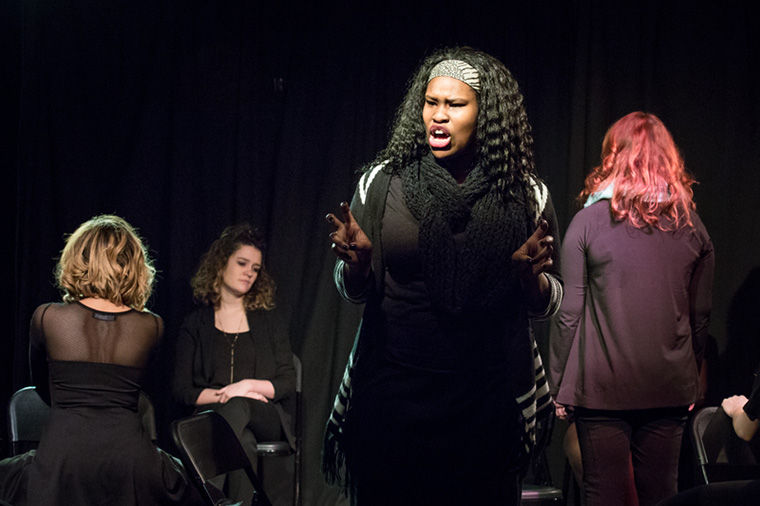‘Vagina Monologues’ works to spread laughs and women’s anecdotes across campus
Dezhane Rouse, a junior theatre major, performed a monologue titled “My Angry Vagina,” as well as pieces discussing issues of sexual assault and transphobia.
February 15, 2016
Dezhane Rouse, a junior theatre major, lamented societal pressures on women to sanitize their vaginas with items like douches and sprays.
Rouse’s monologue, entitled “My Angry Vagina,” was part of a Feb. 11 performance of Eve Ensler’s “The Vagina Monologues” at HAUS, 623 S. Wabash Ave. The play, written in 1996, is a collection of monologues based on interviews Ensler conducted with 200 women about how they individually relate to their vaginas.
The performance became central to “V-Day,” the global activist movement Ensler founded in 1998 to end violence against women.
Stephanie Burda, a senior television major and producer of the show, said she wanted to put on the performance for the last few years because of the effect it had on her.
Taylor Barton, a 2015 theatre alumna and director of the performance, said she wanted to be involved in the production because she is a feminist and wanted to work with Burda to accurately convey the show’s message.
“I was nervous at first, because [the script] was written in the ‘90s and it is not as inclusive as we wish,” Barton said. “The more times I read it, the more I loved it. It needed to be said.”
Barton said she hopes the performance will spark a more inclusive conversation about women’s rights and issues across campus.
Barton said the monologues are an inherent call to action to inspire change among the audience and the college community.
“It is not enough to talk about [change] anymore,” Barton said. “We need to do some changing.”
According to Burda, there was a suggested donation of $5 for admission, and all proceeds are set to go to the Chicago Women’s Health Center.
A.J. Barks, the development director at the Chicago Women’s Health Center, said many Columbia students fall within the demographics of people the health center assists daily.
“Lots of people we see in the center and in our outreach and activities are [at the performance],” Barks said. “It is a chance for us to introduce ourselves to them.”
Ligia Sandoval, a senior theatre and business & entrepreneurship double major, said performers worked one-on-one with Barton, discussing how they identified with their monologues.
“With these pieces, it is not so much about how you deliver it,” Sandoval said. “It is mostly about how you connect with them and how you portray [them].”
Carmen Gabriel, a sophomore theatre major, said she hopes taking part in the performance helps get its message across for all the women who may have related to and gained something from it.
“Based on the audience reaction, I at least got to somebody,” Gabriel said. “That is one person more than if I had not been part of [the performance].”
Davon Roberts, a junior theatre major, said the show was not what he expected it to be.
“I did not expect so much raw emotion and energy,” Roberts said. “As a male, I will never completely be able to understand what women go through on a daily basis, but at least I have some more insight.”








